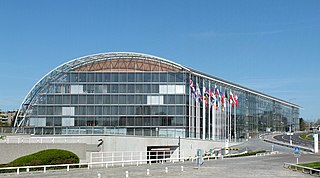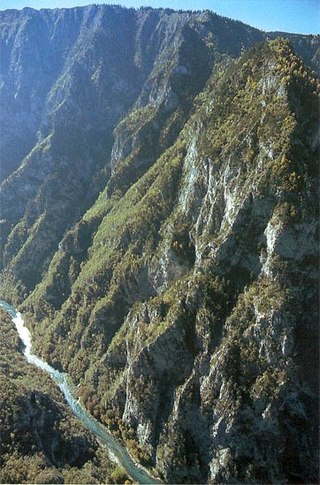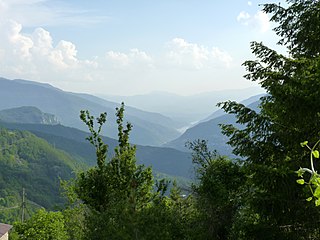
The European Bank for Reconstruction and Development (EBRD) is an international financial institution founded in 1991. As a multilateral developmental investment bank, the EBRD uses investment as a tool to build market economies.

The European Investment Bank (EIB) is the European Union's development bank and is owned by the EU Member States. It is one of the largest supranational lenders in the world. The EIB finances and invests both through equity and debt solutions projects that achieve the policy aims of the European Union through loans, guarantees and technical assistance.

The Tara is a river in Montenegro and Bosnia and Herzegovina. It emerges from the confluence of the Opasnica and Veruša rivers in the Komovi Mountains, part of the Dinaric Alps of Montenegro. The total length is 146 km, of which 141 km are in or on the border of Montenegro,; it also forms the border between the two countries in several places. The Tara flows from south to north - north-west and converges with the Piva at the Bosnia and Herzegovina and Montenegro border between the villages of Šćepan Polje (Montenegro) and Hum to form the Drina river.

The Enguri Dam is a hydroelectric dam on the Enguri River in Tsalenjikha, Georgia. Currently, it is the world's second highest concrete arch dam with a height of 271.5 metres (891 ft). It is located north of the town of Jvari. It is part of the Enguri hydroelectric power station (HES) which is partially located in Abkhazia.

On 25 May 1995, the Army of Republika Srpska (VRS) launched an artillery attack against the town of Tuzla, which left 71 dead and 240 wounded. The event is also known as the Tuzla massacre.

The Ugljevik Power Plant is a coal-fired power plant in Ugljevik, Bosnia and Herzegovina. It is owned and operated by Rudnik i termoelektrana Ugljevik, a subsidiary of Elektroprivreda Republike Srpske. RiTE Ugljevik is an integrated coal mining and power generating company.

The Tara River Canyon, also known as the Tara River Gorge , which is for the most part located in Montenegro, and to a smaller extent in Bosnia and Herzegovina. The most attractive part of the canyon are the high rocks of the mountain range of Ljubišnja, which are located in the UNESCO World Heritage Site of Durmitor National Park.

Energy in Bulgaria is among the most important sectors of the national economy and encompasses energy and electricity production, consumption and transportation in Bulgaria. The national energy policy is implemented by the National Assembly and the Government of Bulgaria, conducted by the Ministry of Energy and regulated by the Energy and Water Regulatory Commission. The state-owned company Bulgarian Energy Holding owns subsidiaries operating in different energy sectors, including electricity: Kozloduy Nuclear Power Plant, Maritsa Iztok 2 Thermal Power Plant, NEK EAD and Elektroenergien sistemen operator (ESO); natural gas: Bulgargaz and Bulgartransgaz; coal mining: Maritsa Iztok Mines. The state holds a 100% stake in the holding company. In Bulgaria, energy prices for households are state-controlled, while commercial electricity prices are determined by the market.

The Turceni Power Station is situated in Gorj County, on the banks of the Jiu River, halfway between the cities of Craiova and Târgu Jiu.
The Buk Bijela Hydro Power Plant is proposed hydroelectric power plant (HPP) on the Drina river in Bosnia and Herzegovina.
Boškov Most Hydro Power Plant, referred to as Boškov Most HPP, is a derivation plant planned to be built in Mala Reka valley, in the southernmost part of the Mavrovo National Park, in North Macedonia. It will have a total capacity of 71,5 MW. Construction is expected to last 4 years.

Tuzla Thermal Power Plant is a coal-fired thermal power plant in Tuzla, Bosnia and Herzegovina. It is the largest power plant in Bosnia and Herzegovina. It is operated by Elektroprivreda Bosne i Hercegovine (EBiH).

Climate change in Europe has resulted in an increase in temperature of 2.3 °C (2022) in Europe compared to pre-industrial levels. Europe is the fastest warming continent in the world. Europe's climate is getting warmer due to anthropogenic activity. According to international climate experts, global temperature rise should not exceed 2 °C to prevent the most dangerous consequences of climate change; without reduction in greenhouse gas emissions, this could happen before 2050. Climate change has implications for all regions of Europe, with the extent and nature of impacts varying across the continent.

RB Kolubara is a Serbian coal mining and smelting complex with headquarters in Lazarevac, Kolubara District. The mine has coal reserves amounting to 2.2 billion tonnes of lignite, one of the largest lignite reserves in Europe, and it produces 22.6 million tonnes of coal per year.
The Kamengrad Coal Mine is a coal mine located in the Una-Sana Canton. The mine has coal reserves amounting to 284.7 million tonnes of lignite, one of the largest coal reserves in Europe and the world. The mine has an annual production capacity of 0.4 million tonnes of coal. Mine provides fuel to Kamengrad lignite power plant.
Kosova e Re, also known as the New Kosovo project, is a plan of the Government of the Republic of Kosovo to build a new 500 MW power plant near Prishtina, to rehabilitate the existing Kosovo B power plant and completely shut down the Kosovo A power plant which is considered the largest source of pollution in Kosovo. It also includes the development of a new lignite mine in order to meet the needs of the Kosovo B and the newly constructed power plant. It is estimated to cost US$2 billion.

Renewables supply a quarter of energy in Turkey, including heat and electricity. Some houses have rooftop solar water heating, and hot water from underground warms many spas and greenhouses. In parts of the west hot rocks are shallow enough to generate electricity as well as heat. Wind turbines, also mainly near western cities and industry, generate a tenth of Turkey’s electricity. Hydropower, mostly from dams in the east, is the only modern renewable energy which is fully exploited. Hydropower averages about a fifth of the country's electricity, but much less in drought years. Apart from wind and hydro, other renewables; such as geothermal, solar and biogas; together generated almost a tenth of Turkey’s electricity in 2022. Türkiye has ranked 5th in Europe and 12th in the world in terms of installed capacity in renewable energy. The share of renewables in Türkiye’s installed power reached to 54% at the end of 2022.

Turkey uses more electricity per person than the global average, but less than the European average, with demand peaking in summer due to air conditioning. Most electricity is generated from coal, gas and hydropower, with hydroelectricity from the east transmitted to big cities in the west. Electricity prices are state-controlled, but wholesale prices are heavily influenced by the cost of imported gas.

Ana Čolović Lešoska is a Macedonian biologist who since 2011 has campaigned against the construction of dams for hydroelectric power production in the Mavrovo National Park in order to safeguard threatened species, including the Balkan lynx. This led to the withdrawal of loans from the World Bank and the European Bank for Reconstruction and Development (EBRD), convincing the Government of North Macedonia to suspend further work on dams in the national park. In recognition of her efforts, in April 2019 she was one of six environmentalists to be awarded the Goldman Environmental Prize.














